Impact of Auditor Independence and Expectation Gap on Audit Quality
VerifiedAdded on 2021/05/30
|11
|2751
|40
Report
AI Summary
This report provides a comprehensive overview of audit quality, emphasizing the crucial roles of auditor independence and the audit expectation gap. It defines auditing and its significance, highlighting the importance of audit quality, which encompasses professional qualifications, skills, experience, adherence to auditing standards, and effective planning. The report explores the concept of auditor independence, discussing its influence on unbiased financial reporting and the potential threats to independence, such as financial relationships and long-term associations. It then delves into the audit expectation gap, explaining the difference between stakeholder expectations and the auditor's scope. The report offers strategies to bridge this gap, such as clear communication and understandable reports. It concludes by emphasizing the impact of these factors on overall audit quality, underscoring their importance in achieving audit objectives and maintaining trust in financial information.
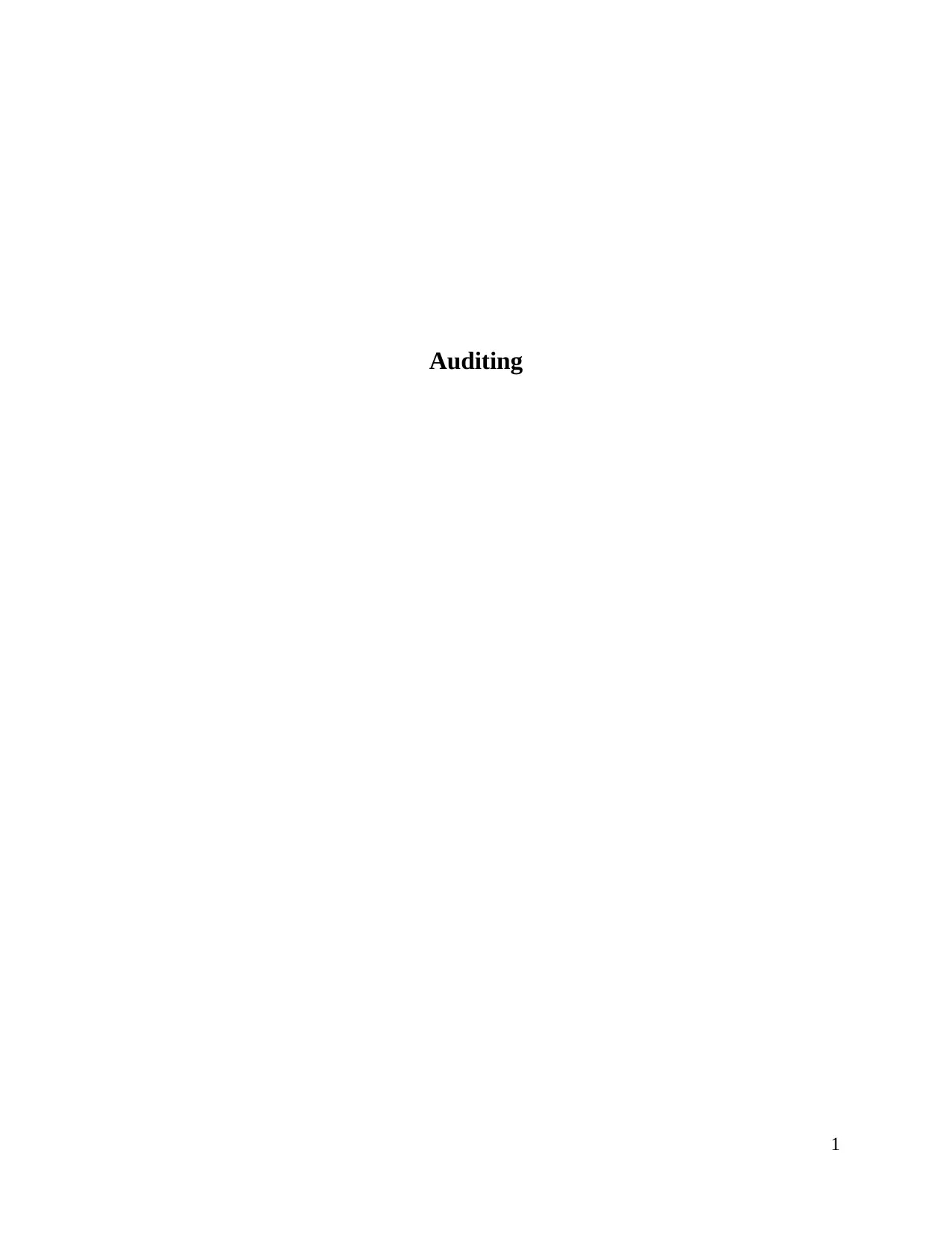
Auditing
1
1
Paraphrase This Document
Need a fresh take? Get an instant paraphrase of this document with our AI Paraphraser
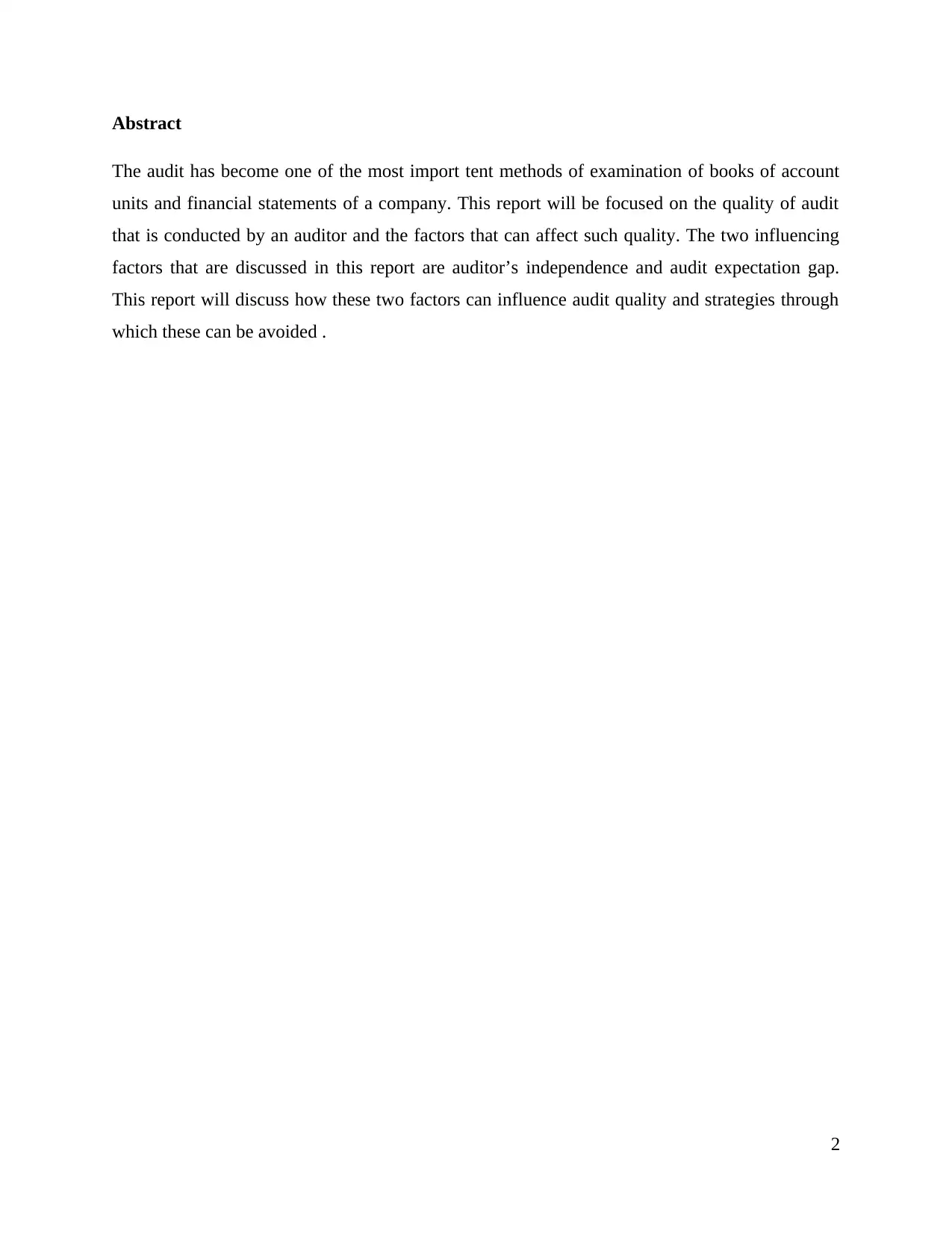
Abstract
The audit has become one of the most import tent methods of examination of books of account
units and financial statements of a company. This report will be focused on the quality of audit
that is conducted by an auditor and the factors that can affect such quality. The two influencing
factors that are discussed in this report are auditor’s independence and audit expectation gap.
This report will discuss how these two factors can influence audit quality and strategies through
which these can be avoided .
2
The audit has become one of the most import tent methods of examination of books of account
units and financial statements of a company. This report will be focused on the quality of audit
that is conducted by an auditor and the factors that can affect such quality. The two influencing
factors that are discussed in this report are auditor’s independence and audit expectation gap.
This report will discuss how these two factors can influence audit quality and strategies through
which these can be avoided .
2
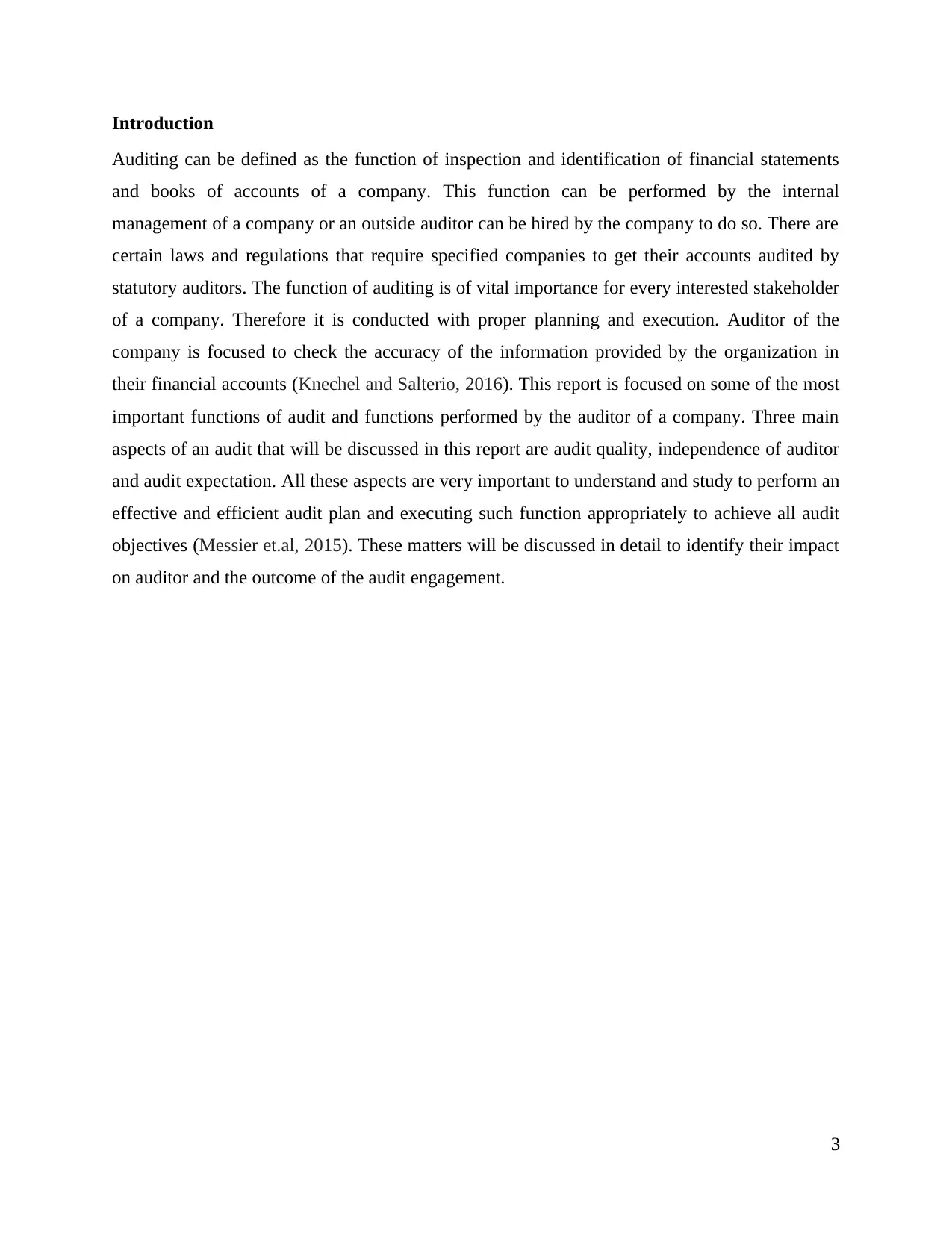
Introduction
Auditing can be defined as the function of inspection and identification of financial statements
and books of accounts of a company. This function can be performed by the internal
management of a company or an outside auditor can be hired by the company to do so. There are
certain laws and regulations that require specified companies to get their accounts audited by
statutory auditors. The function of auditing is of vital importance for every interested stakeholder
of a company. Therefore it is conducted with proper planning and execution. Auditor of the
company is focused to check the accuracy of the information provided by the organization in
their financial accounts (Knechel and Salterio, 2016). This report is focused on some of the most
important functions of audit and functions performed by the auditor of a company. Three main
aspects of an audit that will be discussed in this report are audit quality, independence of auditor
and audit expectation. All these aspects are very important to understand and study to perform an
effective and efficient audit plan and executing such function appropriately to achieve all audit
objectives (Messier et.al, 2015). These matters will be discussed in detail to identify their impact
on auditor and the outcome of the audit engagement.
3
Auditing can be defined as the function of inspection and identification of financial statements
and books of accounts of a company. This function can be performed by the internal
management of a company or an outside auditor can be hired by the company to do so. There are
certain laws and regulations that require specified companies to get their accounts audited by
statutory auditors. The function of auditing is of vital importance for every interested stakeholder
of a company. Therefore it is conducted with proper planning and execution. Auditor of the
company is focused to check the accuracy of the information provided by the organization in
their financial accounts (Knechel and Salterio, 2016). This report is focused on some of the most
important functions of audit and functions performed by the auditor of a company. Three main
aspects of an audit that will be discussed in this report are audit quality, independence of auditor
and audit expectation. All these aspects are very important to understand and study to perform an
effective and efficient audit plan and executing such function appropriately to achieve all audit
objectives (Messier et.al, 2015). These matters will be discussed in detail to identify their impact
on auditor and the outcome of the audit engagement.
3
⊘ This is a preview!⊘
Do you want full access?
Subscribe today to unlock all pages.

Trusted by 1+ million students worldwide
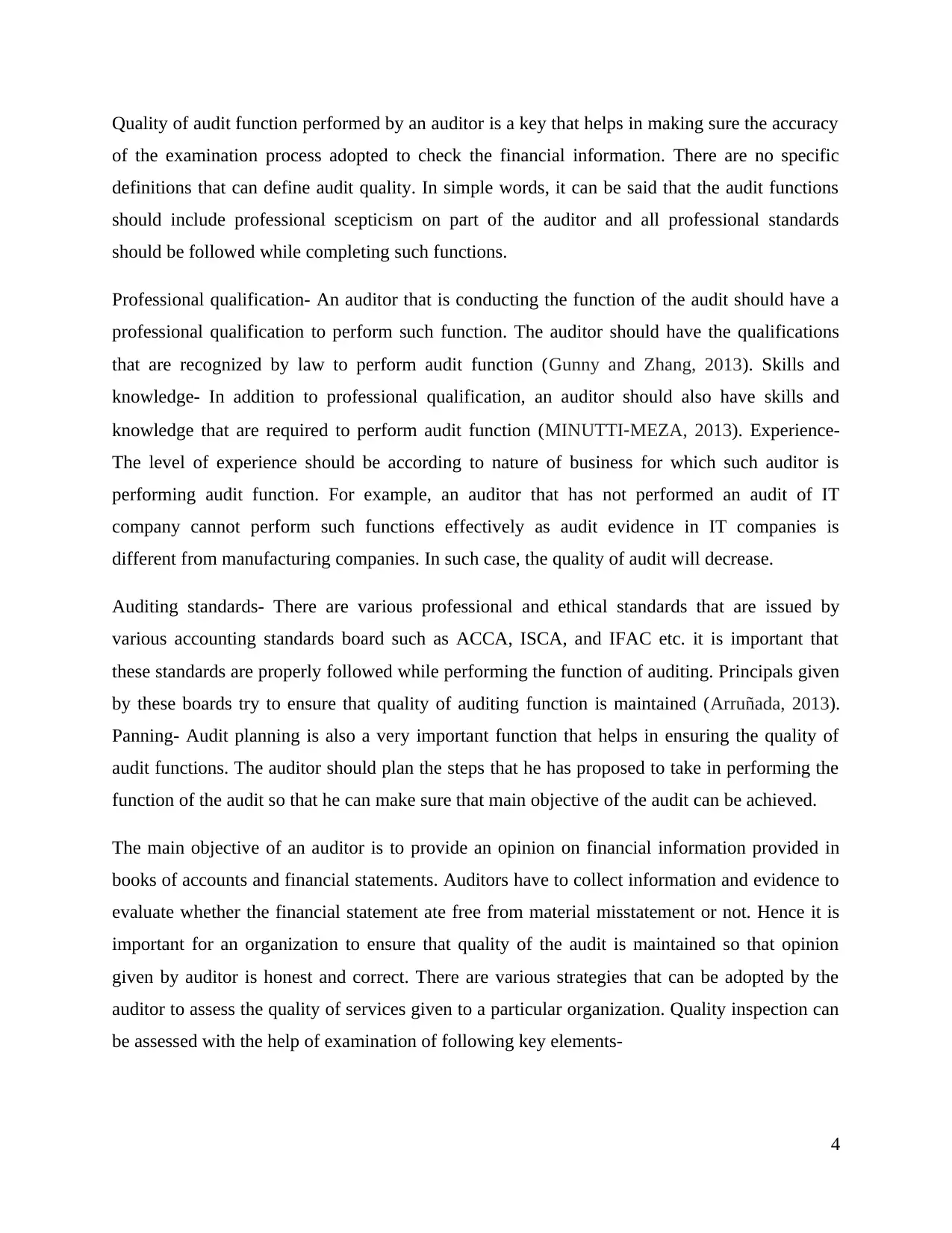
Quality of audit function performed by an auditor is a key that helps in making sure the accuracy
of the examination process adopted to check the financial information. There are no specific
definitions that can define audit quality. In simple words, it can be said that the audit functions
should include professional scepticism on part of the auditor and all professional standards
should be followed while completing such functions.
Professional qualification- An auditor that is conducting the function of the audit should have a
professional qualification to perform such function. The auditor should have the qualifications
that are recognized by law to perform audit function (Gunny and Zhang, 2013). Skills and
knowledge- In addition to professional qualification, an auditor should also have skills and
knowledge that are required to perform audit function (MINUTTI‐MEZA, 2013). Experience-
The level of experience should be according to nature of business for which such auditor is
performing audit function. For example, an auditor that has not performed an audit of IT
company cannot perform such functions effectively as audit evidence in IT companies is
different from manufacturing companies. In such case, the quality of audit will decrease.
Auditing standards- There are various professional and ethical standards that are issued by
various accounting standards board such as ACCA, ISCA, and IFAC etc. it is important that
these standards are properly followed while performing the function of auditing. Principals given
by these boards try to ensure that quality of auditing function is maintained (Arruñada, 2013).
Panning- Audit planning is also a very important function that helps in ensuring the quality of
audit functions. The auditor should plan the steps that he has proposed to take in performing the
function of the audit so that he can make sure that main objective of the audit can be achieved.
The main objective of an auditor is to provide an opinion on financial information provided in
books of accounts and financial statements. Auditors have to collect information and evidence to
evaluate whether the financial statement ate free from material misstatement or not. Hence it is
important for an organization to ensure that quality of the audit is maintained so that opinion
given by auditor is honest and correct. There are various strategies that can be adopted by the
auditor to assess the quality of services given to a particular organization. Quality inspection can
be assessed with the help of examination of following key elements-
4
of the examination process adopted to check the financial information. There are no specific
definitions that can define audit quality. In simple words, it can be said that the audit functions
should include professional scepticism on part of the auditor and all professional standards
should be followed while completing such functions.
Professional qualification- An auditor that is conducting the function of the audit should have a
professional qualification to perform such function. The auditor should have the qualifications
that are recognized by law to perform audit function (Gunny and Zhang, 2013). Skills and
knowledge- In addition to professional qualification, an auditor should also have skills and
knowledge that are required to perform audit function (MINUTTI‐MEZA, 2013). Experience-
The level of experience should be according to nature of business for which such auditor is
performing audit function. For example, an auditor that has not performed an audit of IT
company cannot perform such functions effectively as audit evidence in IT companies is
different from manufacturing companies. In such case, the quality of audit will decrease.
Auditing standards- There are various professional and ethical standards that are issued by
various accounting standards board such as ACCA, ISCA, and IFAC etc. it is important that
these standards are properly followed while performing the function of auditing. Principals given
by these boards try to ensure that quality of auditing function is maintained (Arruñada, 2013).
Panning- Audit planning is also a very important function that helps in ensuring the quality of
audit functions. The auditor should plan the steps that he has proposed to take in performing the
function of the audit so that he can make sure that main objective of the audit can be achieved.
The main objective of an auditor is to provide an opinion on financial information provided in
books of accounts and financial statements. Auditors have to collect information and evidence to
evaluate whether the financial statement ate free from material misstatement or not. Hence it is
important for an organization to ensure that quality of the audit is maintained so that opinion
given by auditor is honest and correct. There are various strategies that can be adopted by the
auditor to assess the quality of services given to a particular organization. Quality inspection can
be assessed with the help of examination of following key elements-
4
Paraphrase This Document
Need a fresh take? Get an instant paraphrase of this document with our AI Paraphraser
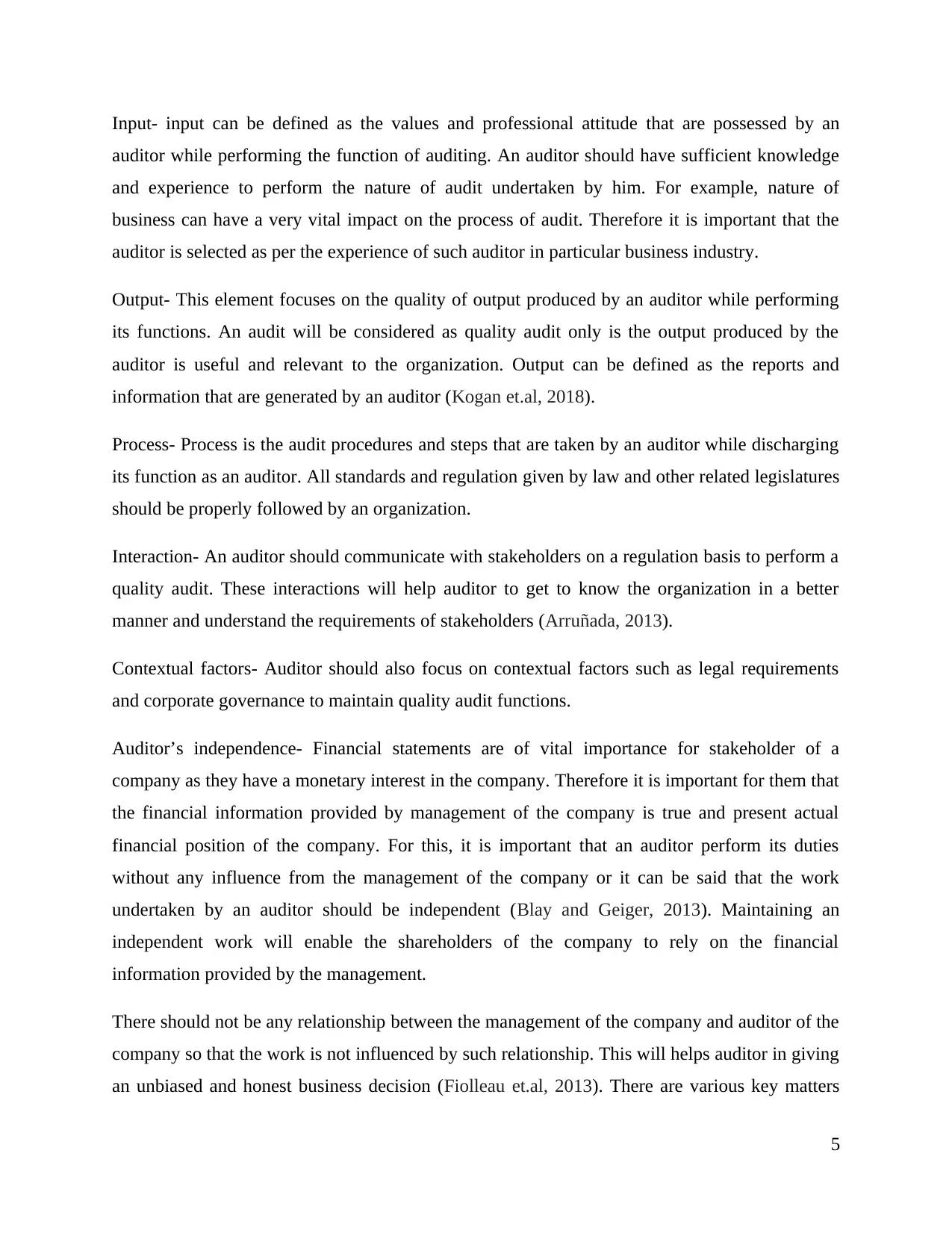
Input- input can be defined as the values and professional attitude that are possessed by an
auditor while performing the function of auditing. An auditor should have sufficient knowledge
and experience to perform the nature of audit undertaken by him. For example, nature of
business can have a very vital impact on the process of audit. Therefore it is important that the
auditor is selected as per the experience of such auditor in particular business industry.
Output- This element focuses on the quality of output produced by an auditor while performing
its functions. An audit will be considered as quality audit only is the output produced by the
auditor is useful and relevant to the organization. Output can be defined as the reports and
information that are generated by an auditor (Kogan et.al, 2018).
Process- Process is the audit procedures and steps that are taken by an auditor while discharging
its function as an auditor. All standards and regulation given by law and other related legislatures
should be properly followed by an organization.
Interaction- An auditor should communicate with stakeholders on a regulation basis to perform a
quality audit. These interactions will help auditor to get to know the organization in a better
manner and understand the requirements of stakeholders (Arruñada, 2013).
Contextual factors- Auditor should also focus on contextual factors such as legal requirements
and corporate governance to maintain quality audit functions.
Auditor’s independence- Financial statements are of vital importance for stakeholder of a
company as they have a monetary interest in the company. Therefore it is important for them that
the financial information provided by management of the company is true and present actual
financial position of the company. For this, it is important that an auditor perform its duties
without any influence from the management of the company or it can be said that the work
undertaken by an auditor should be independent (Blay and Geiger, 2013). Maintaining an
independent work will enable the shareholders of the company to rely on the financial
information provided by the management.
There should not be any relationship between the management of the company and auditor of the
company so that the work is not influenced by such relationship. This will helps auditor in giving
an unbiased and honest business decision (Fiolleau et.al, 2013). There are various key matters
5
auditor while performing the function of auditing. An auditor should have sufficient knowledge
and experience to perform the nature of audit undertaken by him. For example, nature of
business can have a very vital impact on the process of audit. Therefore it is important that the
auditor is selected as per the experience of such auditor in particular business industry.
Output- This element focuses on the quality of output produced by an auditor while performing
its functions. An audit will be considered as quality audit only is the output produced by the
auditor is useful and relevant to the organization. Output can be defined as the reports and
information that are generated by an auditor (Kogan et.al, 2018).
Process- Process is the audit procedures and steps that are taken by an auditor while discharging
its function as an auditor. All standards and regulation given by law and other related legislatures
should be properly followed by an organization.
Interaction- An auditor should communicate with stakeholders on a regulation basis to perform a
quality audit. These interactions will help auditor to get to know the organization in a better
manner and understand the requirements of stakeholders (Arruñada, 2013).
Contextual factors- Auditor should also focus on contextual factors such as legal requirements
and corporate governance to maintain quality audit functions.
Auditor’s independence- Financial statements are of vital importance for stakeholder of a
company as they have a monetary interest in the company. Therefore it is important for them that
the financial information provided by management of the company is true and present actual
financial position of the company. For this, it is important that an auditor perform its duties
without any influence from the management of the company or it can be said that the work
undertaken by an auditor should be independent (Blay and Geiger, 2013). Maintaining an
independent work will enable the shareholders of the company to rely on the financial
information provided by the management.
There should not be any relationship between the management of the company and auditor of the
company so that the work is not influenced by such relationship. This will helps auditor in giving
an unbiased and honest business decision (Fiolleau et.al, 2013). There are various key matters
5
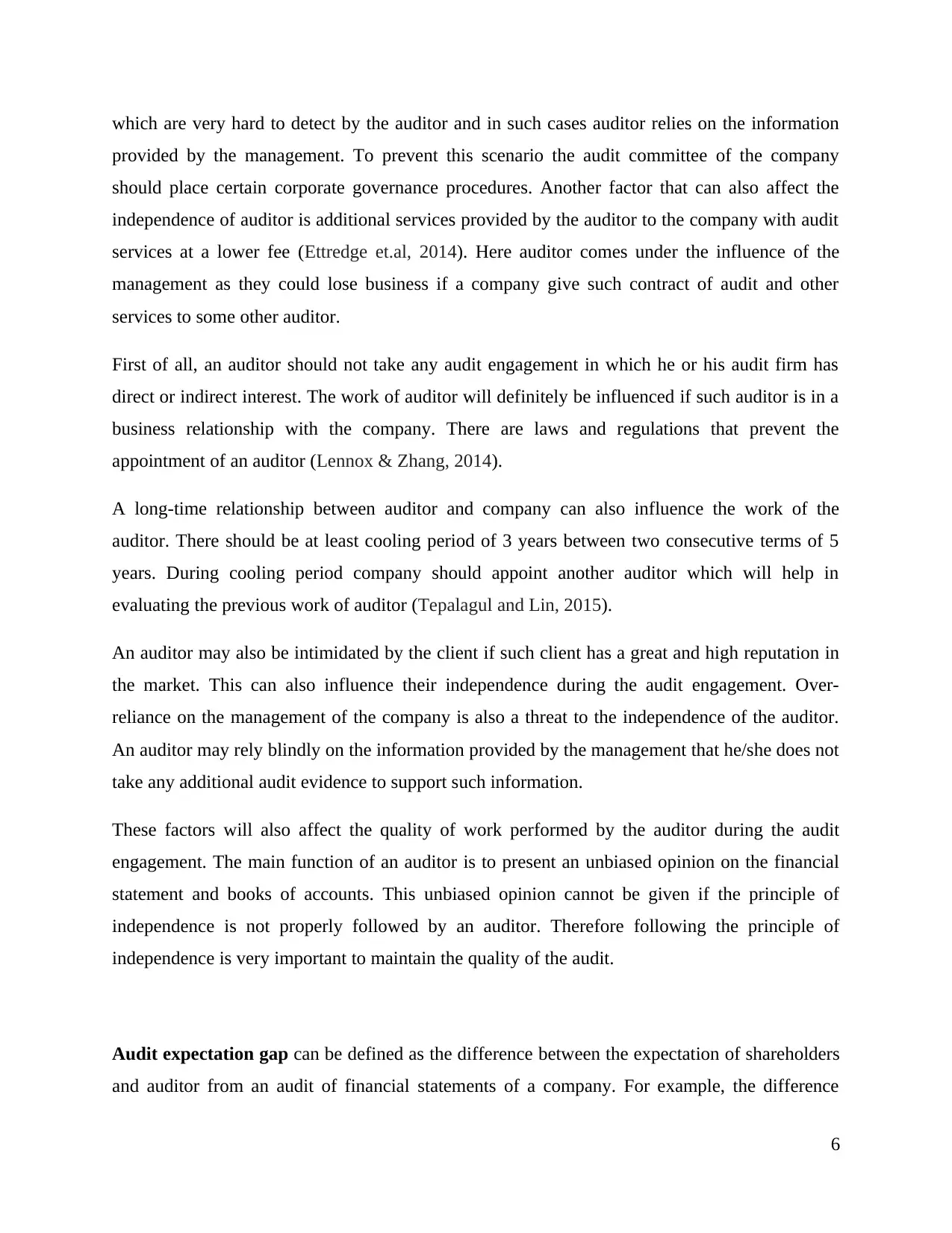
which are very hard to detect by the auditor and in such cases auditor relies on the information
provided by the management. To prevent this scenario the audit committee of the company
should place certain corporate governance procedures. Another factor that can also affect the
independence of auditor is additional services provided by the auditor to the company with audit
services at a lower fee (Ettredge et.al, 2014). Here auditor comes under the influence of the
management as they could lose business if a company give such contract of audit and other
services to some other auditor.
First of all, an auditor should not take any audit engagement in which he or his audit firm has
direct or indirect interest. The work of auditor will definitely be influenced if such auditor is in a
business relationship with the company. There are laws and regulations that prevent the
appointment of an auditor (Lennox & Zhang, 2014).
A long-time relationship between auditor and company can also influence the work of the
auditor. There should be at least cooling period of 3 years between two consecutive terms of 5
years. During cooling period company should appoint another auditor which will help in
evaluating the previous work of auditor (Tepalagul and Lin, 2015).
An auditor may also be intimidated by the client if such client has a great and high reputation in
the market. This can also influence their independence during the audit engagement. Over-
reliance on the management of the company is also a threat to the independence of the auditor.
An auditor may rely blindly on the information provided by the management that he/she does not
take any additional audit evidence to support such information.
These factors will also affect the quality of work performed by the auditor during the audit
engagement. The main function of an auditor is to present an unbiased opinion on the financial
statement and books of accounts. This unbiased opinion cannot be given if the principle of
independence is not properly followed by an auditor. Therefore following the principle of
independence is very important to maintain the quality of the audit.
Audit expectation gap can be defined as the difference between the expectation of shareholders
and auditor from an audit of financial statements of a company. For example, the difference
6
provided by the management. To prevent this scenario the audit committee of the company
should place certain corporate governance procedures. Another factor that can also affect the
independence of auditor is additional services provided by the auditor to the company with audit
services at a lower fee (Ettredge et.al, 2014). Here auditor comes under the influence of the
management as they could lose business if a company give such contract of audit and other
services to some other auditor.
First of all, an auditor should not take any audit engagement in which he or his audit firm has
direct or indirect interest. The work of auditor will definitely be influenced if such auditor is in a
business relationship with the company. There are laws and regulations that prevent the
appointment of an auditor (Lennox & Zhang, 2014).
A long-time relationship between auditor and company can also influence the work of the
auditor. There should be at least cooling period of 3 years between two consecutive terms of 5
years. During cooling period company should appoint another auditor which will help in
evaluating the previous work of auditor (Tepalagul and Lin, 2015).
An auditor may also be intimidated by the client if such client has a great and high reputation in
the market. This can also influence their independence during the audit engagement. Over-
reliance on the management of the company is also a threat to the independence of the auditor.
An auditor may rely blindly on the information provided by the management that he/she does not
take any additional audit evidence to support such information.
These factors will also affect the quality of work performed by the auditor during the audit
engagement. The main function of an auditor is to present an unbiased opinion on the financial
statement and books of accounts. This unbiased opinion cannot be given if the principle of
independence is not properly followed by an auditor. Therefore following the principle of
independence is very important to maintain the quality of the audit.
Audit expectation gap can be defined as the difference between the expectation of shareholders
and auditor from an audit of financial statements of a company. For example, the difference
6
⊘ This is a preview!⊘
Do you want full access?
Subscribe today to unlock all pages.

Trusted by 1+ million students worldwide
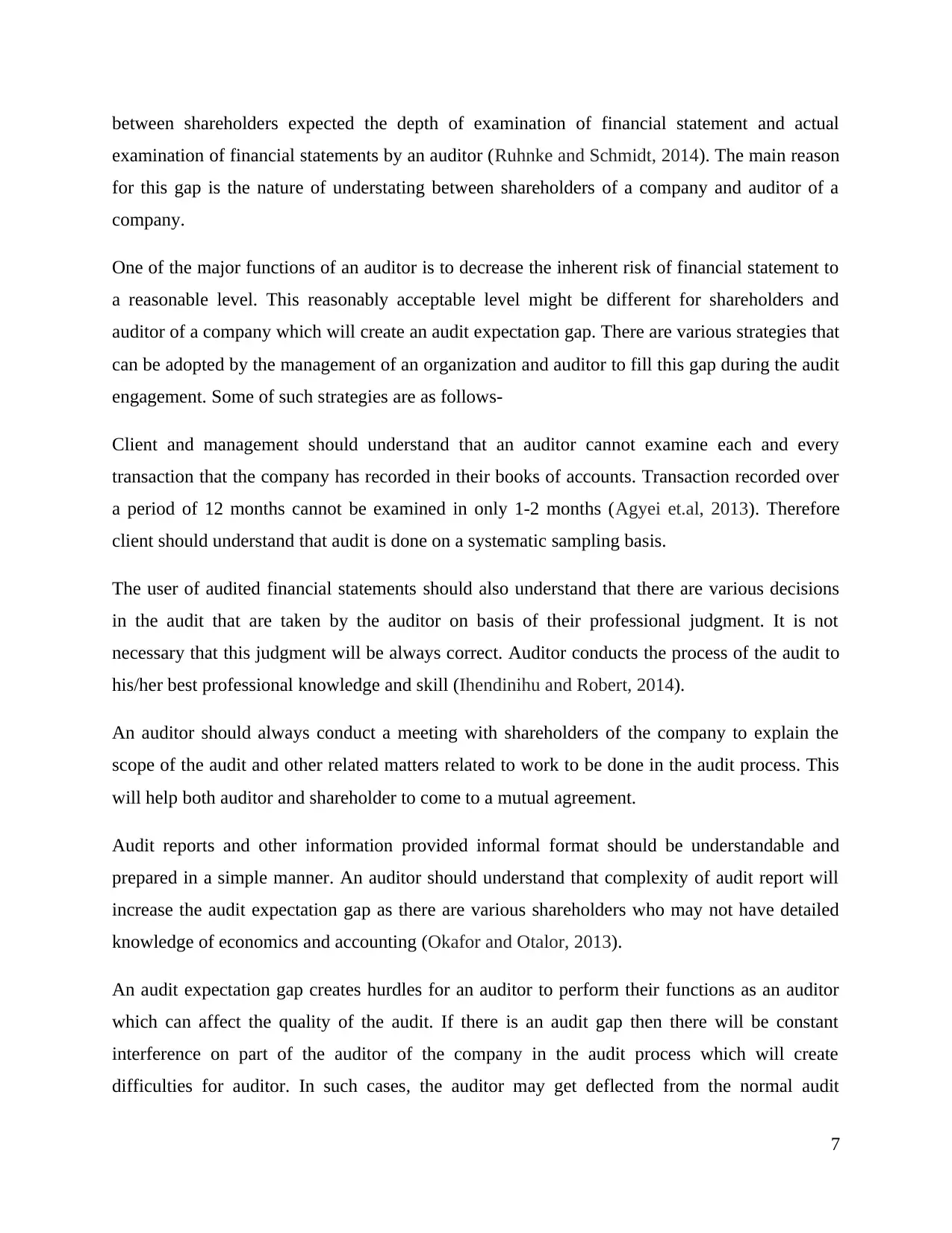
between shareholders expected the depth of examination of financial statement and actual
examination of financial statements by an auditor (Ruhnke and Schmidt, 2014). The main reason
for this gap is the nature of understating between shareholders of a company and auditor of a
company.
One of the major functions of an auditor is to decrease the inherent risk of financial statement to
a reasonable level. This reasonably acceptable level might be different for shareholders and
auditor of a company which will create an audit expectation gap. There are various strategies that
can be adopted by the management of an organization and auditor to fill this gap during the audit
engagement. Some of such strategies are as follows-
Client and management should understand that an auditor cannot examine each and every
transaction that the company has recorded in their books of accounts. Transaction recorded over
a period of 12 months cannot be examined in only 1-2 months (Agyei et.al, 2013). Therefore
client should understand that audit is done on a systematic sampling basis.
The user of audited financial statements should also understand that there are various decisions
in the audit that are taken by the auditor on basis of their professional judgment. It is not
necessary that this judgment will be always correct. Auditor conducts the process of the audit to
his/her best professional knowledge and skill (Ihendinihu and Robert, 2014).
An auditor should always conduct a meeting with shareholders of the company to explain the
scope of the audit and other related matters related to work to be done in the audit process. This
will help both auditor and shareholder to come to a mutual agreement.
Audit reports and other information provided informal format should be understandable and
prepared in a simple manner. An auditor should understand that complexity of audit report will
increase the audit expectation gap as there are various shareholders who may not have detailed
knowledge of economics and accounting (Okafor and Otalor, 2013).
An audit expectation gap creates hurdles for an auditor to perform their functions as an auditor
which can affect the quality of the audit. If there is an audit gap then there will be constant
interference on part of the auditor of the company in the audit process which will create
difficulties for auditor. In such cases, the auditor may get deflected from the normal audit
7
examination of financial statements by an auditor (Ruhnke and Schmidt, 2014). The main reason
for this gap is the nature of understating between shareholders of a company and auditor of a
company.
One of the major functions of an auditor is to decrease the inherent risk of financial statement to
a reasonable level. This reasonably acceptable level might be different for shareholders and
auditor of a company which will create an audit expectation gap. There are various strategies that
can be adopted by the management of an organization and auditor to fill this gap during the audit
engagement. Some of such strategies are as follows-
Client and management should understand that an auditor cannot examine each and every
transaction that the company has recorded in their books of accounts. Transaction recorded over
a period of 12 months cannot be examined in only 1-2 months (Agyei et.al, 2013). Therefore
client should understand that audit is done on a systematic sampling basis.
The user of audited financial statements should also understand that there are various decisions
in the audit that are taken by the auditor on basis of their professional judgment. It is not
necessary that this judgment will be always correct. Auditor conducts the process of the audit to
his/her best professional knowledge and skill (Ihendinihu and Robert, 2014).
An auditor should always conduct a meeting with shareholders of the company to explain the
scope of the audit and other related matters related to work to be done in the audit process. This
will help both auditor and shareholder to come to a mutual agreement.
Audit reports and other information provided informal format should be understandable and
prepared in a simple manner. An auditor should understand that complexity of audit report will
increase the audit expectation gap as there are various shareholders who may not have detailed
knowledge of economics and accounting (Okafor and Otalor, 2013).
An audit expectation gap creates hurdles for an auditor to perform their functions as an auditor
which can affect the quality of the audit. If there is an audit gap then there will be constant
interference on part of the auditor of the company in the audit process which will create
difficulties for auditor. In such cases, the auditor may get deflected from the normal audit
7
Paraphrase This Document
Need a fresh take? Get an instant paraphrase of this document with our AI Paraphraser
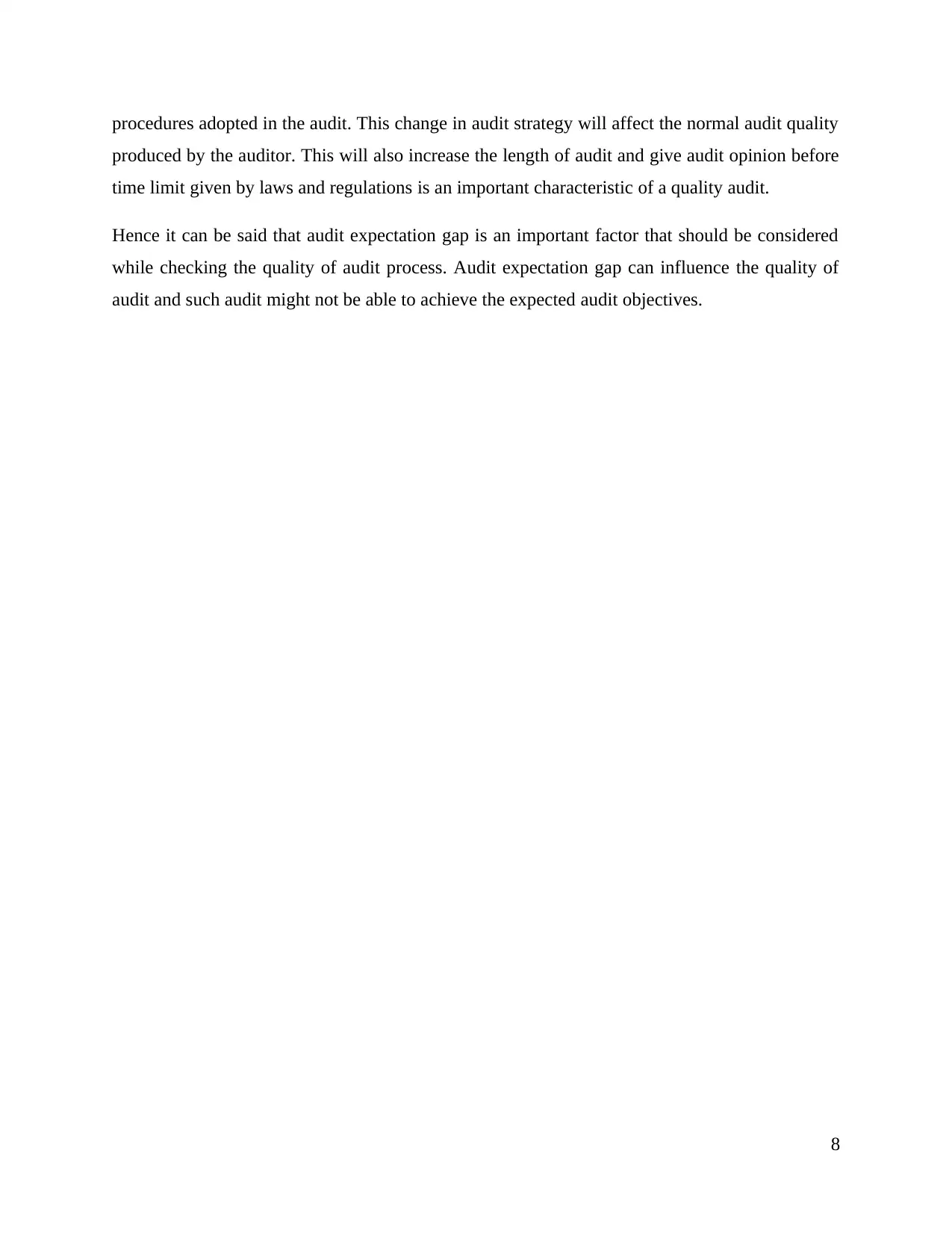
procedures adopted in the audit. This change in audit strategy will affect the normal audit quality
produced by the auditor. This will also increase the length of audit and give audit opinion before
time limit given by laws and regulations is an important characteristic of a quality audit.
Hence it can be said that audit expectation gap is an important factor that should be considered
while checking the quality of audit process. Audit expectation gap can influence the quality of
audit and such audit might not be able to achieve the expected audit objectives.
8
produced by the auditor. This will also increase the length of audit and give audit opinion before
time limit given by laws and regulations is an important characteristic of a quality audit.
Hence it can be said that audit expectation gap is an important factor that should be considered
while checking the quality of audit process. Audit expectation gap can influence the quality of
audit and such audit might not be able to achieve the expected audit objectives.
8
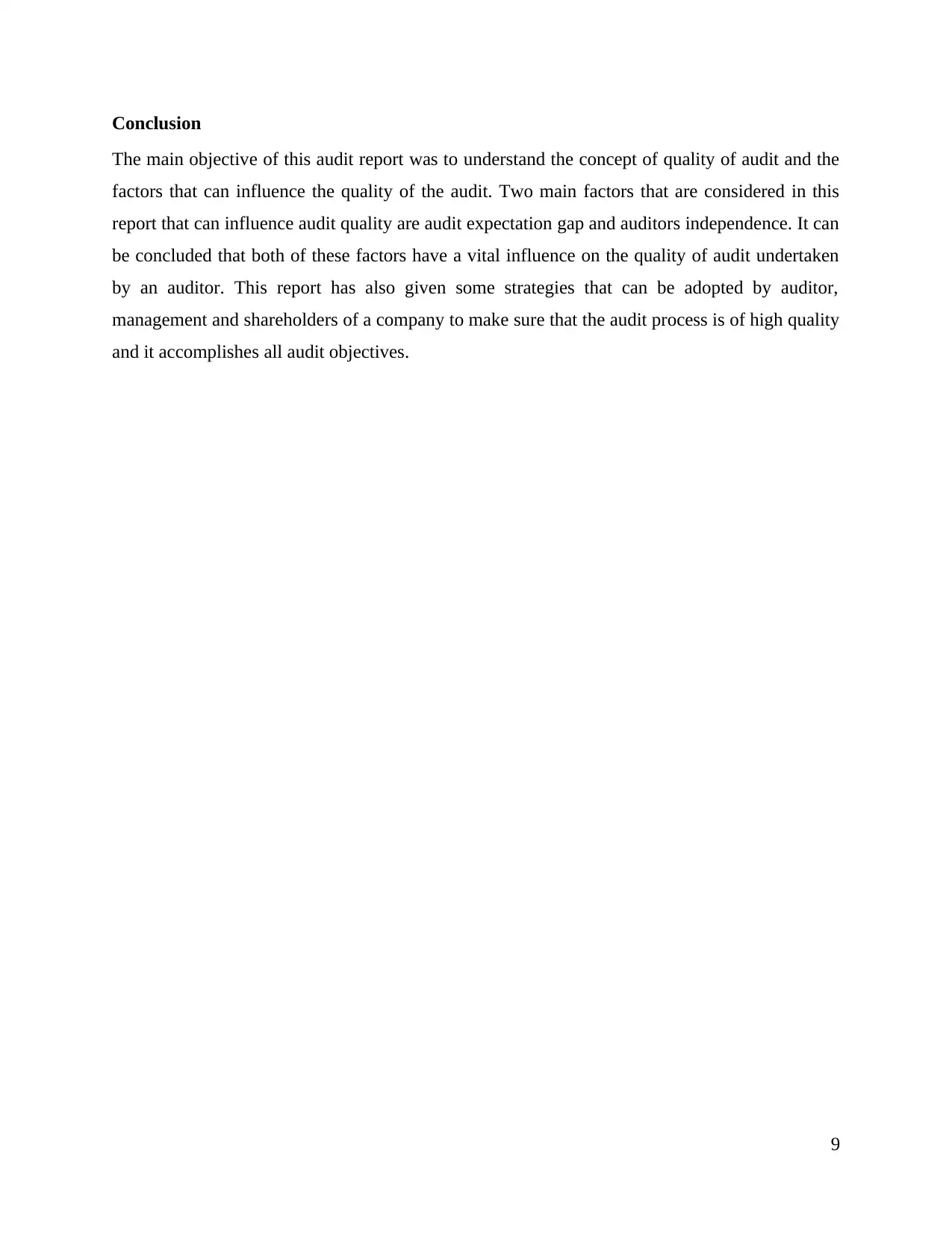
Conclusion
The main objective of this audit report was to understand the concept of quality of audit and the
factors that can influence the quality of the audit. Two main factors that are considered in this
report that can influence audit quality are audit expectation gap and auditors independence. It can
be concluded that both of these factors have a vital influence on the quality of audit undertaken
by an auditor. This report has also given some strategies that can be adopted by auditor,
management and shareholders of a company to make sure that the audit process is of high quality
and it accomplishes all audit objectives.
9
The main objective of this audit report was to understand the concept of quality of audit and the
factors that can influence the quality of the audit. Two main factors that are considered in this
report that can influence audit quality are audit expectation gap and auditors independence. It can
be concluded that both of these factors have a vital influence on the quality of audit undertaken
by an auditor. This report has also given some strategies that can be adopted by auditor,
management and shareholders of a company to make sure that the audit process is of high quality
and it accomplishes all audit objectives.
9
⊘ This is a preview!⊘
Do you want full access?
Subscribe today to unlock all pages.

Trusted by 1+ million students worldwide
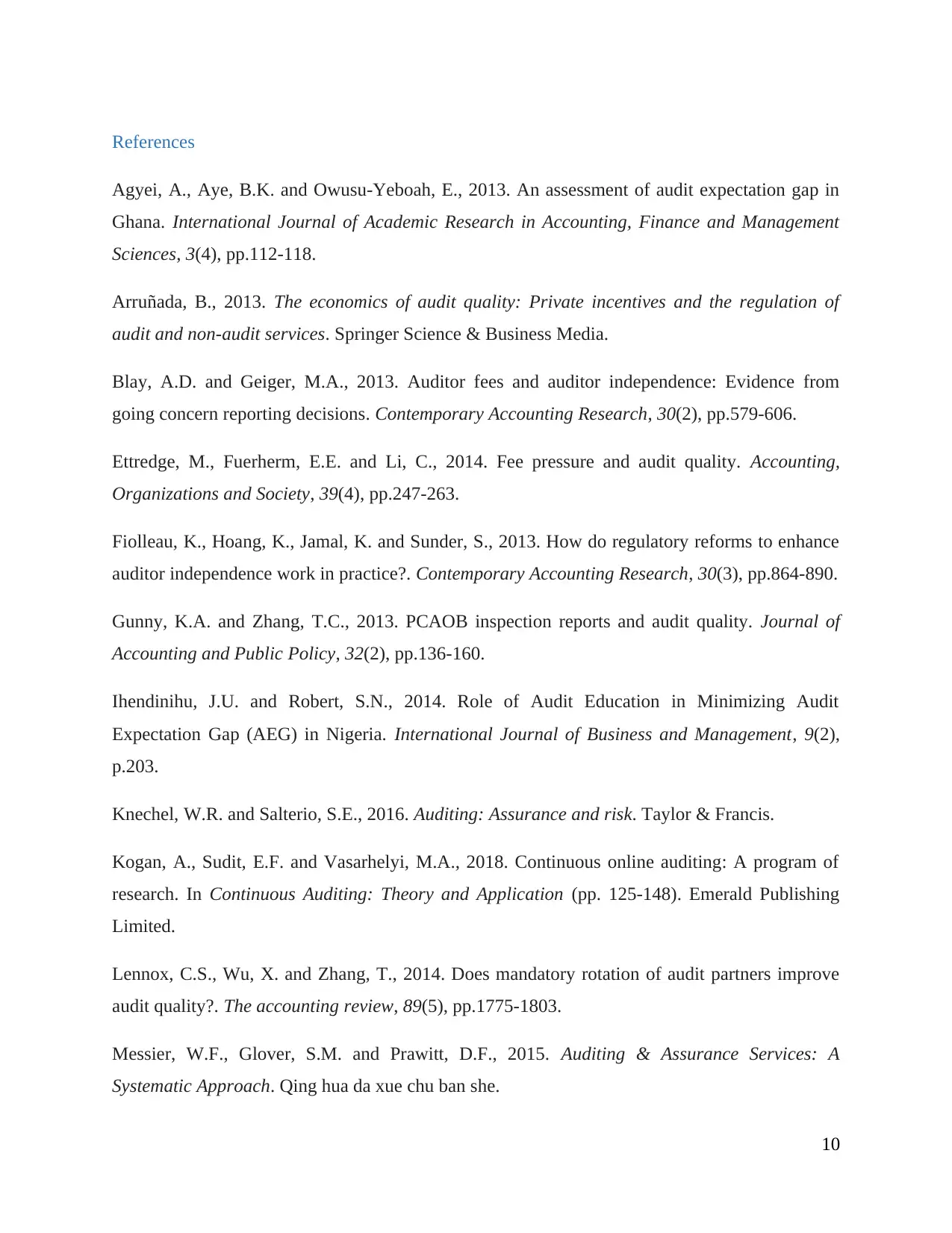
References
Agyei, A., Aye, B.K. and Owusu-Yeboah, E., 2013. An assessment of audit expectation gap in
Ghana. International Journal of Academic Research in Accounting, Finance and Management
Sciences, 3(4), pp.112-118.
Arruñada, B., 2013. The economics of audit quality: Private incentives and the regulation of
audit and non-audit services. Springer Science & Business Media.
Blay, A.D. and Geiger, M.A., 2013. Auditor fees and auditor independence: Evidence from
going concern reporting decisions. Contemporary Accounting Research, 30(2), pp.579-606.
Ettredge, M., Fuerherm, E.E. and Li, C., 2014. Fee pressure and audit quality. Accounting,
Organizations and Society, 39(4), pp.247-263.
Fiolleau, K., Hoang, K., Jamal, K. and Sunder, S., 2013. How do regulatory reforms to enhance
auditor independence work in practice?. Contemporary Accounting Research, 30(3), pp.864-890.
Gunny, K.A. and Zhang, T.C., 2013. PCAOB inspection reports and audit quality. Journal of
Accounting and Public Policy, 32(2), pp.136-160.
Ihendinihu, J.U. and Robert, S.N., 2014. Role of Audit Education in Minimizing Audit
Expectation Gap (AEG) in Nigeria. International Journal of Business and Management, 9(2),
p.203.
Knechel, W.R. and Salterio, S.E., 2016. Auditing: Assurance and risk. Taylor & Francis.
Kogan, A., Sudit, E.F. and Vasarhelyi, M.A., 2018. Continuous online auditing: A program of
research. In Continuous Auditing: Theory and Application (pp. 125-148). Emerald Publishing
Limited.
Lennox, C.S., Wu, X. and Zhang, T., 2014. Does mandatory rotation of audit partners improve
audit quality?. The accounting review, 89(5), pp.1775-1803.
Messier, W.F., Glover, S.M. and Prawitt, D.F., 2015. Auditing & Assurance Services: A
Systematic Approach. Qing hua da xue chu ban she.
10
Agyei, A., Aye, B.K. and Owusu-Yeboah, E., 2013. An assessment of audit expectation gap in
Ghana. International Journal of Academic Research in Accounting, Finance and Management
Sciences, 3(4), pp.112-118.
Arruñada, B., 2013. The economics of audit quality: Private incentives and the regulation of
audit and non-audit services. Springer Science & Business Media.
Blay, A.D. and Geiger, M.A., 2013. Auditor fees and auditor independence: Evidence from
going concern reporting decisions. Contemporary Accounting Research, 30(2), pp.579-606.
Ettredge, M., Fuerherm, E.E. and Li, C., 2014. Fee pressure and audit quality. Accounting,
Organizations and Society, 39(4), pp.247-263.
Fiolleau, K., Hoang, K., Jamal, K. and Sunder, S., 2013. How do regulatory reforms to enhance
auditor independence work in practice?. Contemporary Accounting Research, 30(3), pp.864-890.
Gunny, K.A. and Zhang, T.C., 2013. PCAOB inspection reports and audit quality. Journal of
Accounting and Public Policy, 32(2), pp.136-160.
Ihendinihu, J.U. and Robert, S.N., 2014. Role of Audit Education in Minimizing Audit
Expectation Gap (AEG) in Nigeria. International Journal of Business and Management, 9(2),
p.203.
Knechel, W.R. and Salterio, S.E., 2016. Auditing: Assurance and risk. Taylor & Francis.
Kogan, A., Sudit, E.F. and Vasarhelyi, M.A., 2018. Continuous online auditing: A program of
research. In Continuous Auditing: Theory and Application (pp. 125-148). Emerald Publishing
Limited.
Lennox, C.S., Wu, X. and Zhang, T., 2014. Does mandatory rotation of audit partners improve
audit quality?. The accounting review, 89(5), pp.1775-1803.
Messier, W.F., Glover, S.M. and Prawitt, D.F., 2015. Auditing & Assurance Services: A
Systematic Approach. Qing hua da xue chu ban she.
10
Paraphrase This Document
Need a fresh take? Get an instant paraphrase of this document with our AI Paraphraser
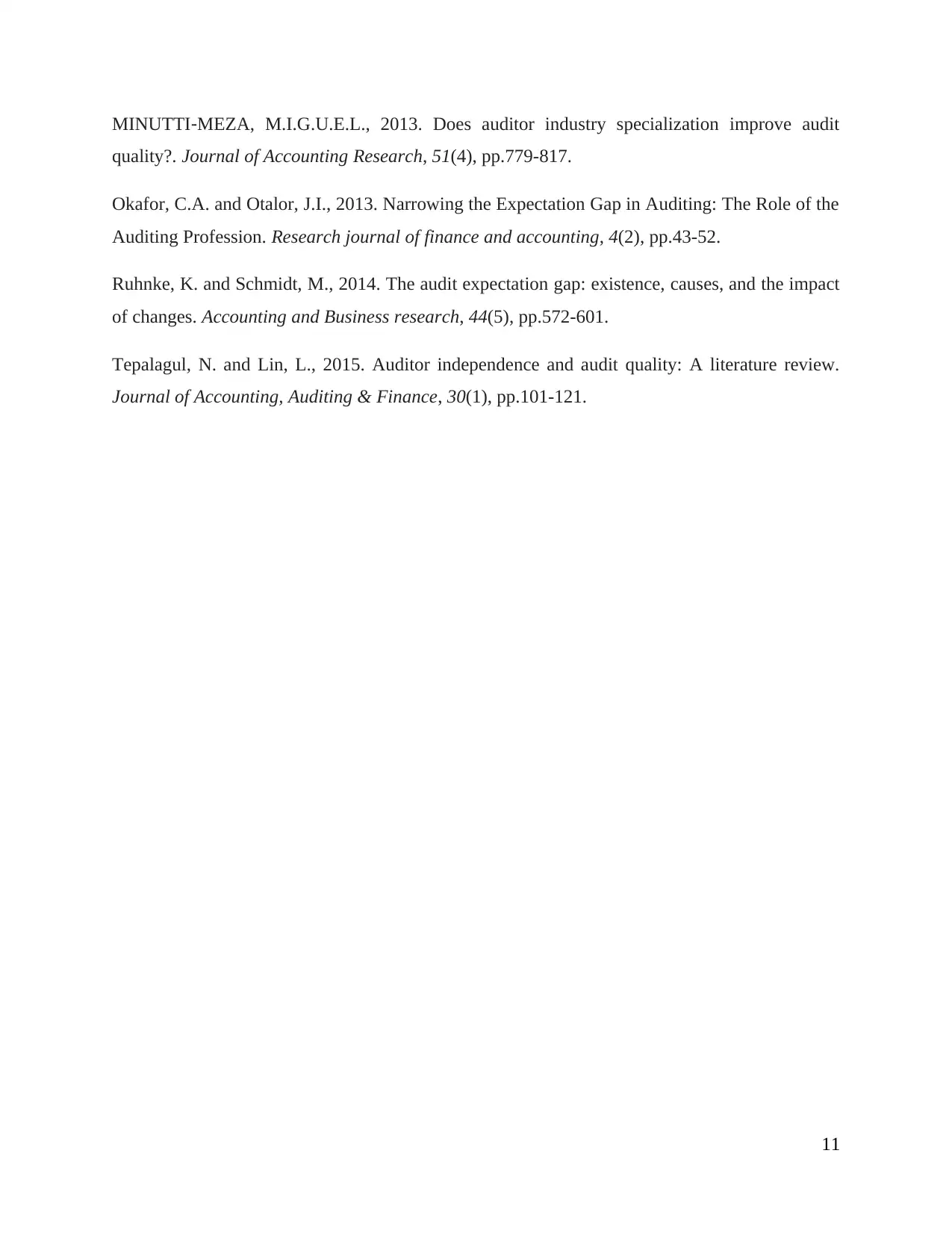
MINUTTI‐MEZA, M.I.G.U.E.L., 2013. Does auditor industry specialization improve audit
quality?. Journal of Accounting Research, 51(4), pp.779-817.
Okafor, C.A. and Otalor, J.I., 2013. Narrowing the Expectation Gap in Auditing: The Role of the
Auditing Profession. Research journal of finance and accounting, 4(2), pp.43-52.
Ruhnke, K. and Schmidt, M., 2014. The audit expectation gap: existence, causes, and the impact
of changes. Accounting and Business research, 44(5), pp.572-601.
Tepalagul, N. and Lin, L., 2015. Auditor independence and audit quality: A literature review.
Journal of Accounting, Auditing & Finance, 30(1), pp.101-121.
11
quality?. Journal of Accounting Research, 51(4), pp.779-817.
Okafor, C.A. and Otalor, J.I., 2013. Narrowing the Expectation Gap in Auditing: The Role of the
Auditing Profession. Research journal of finance and accounting, 4(2), pp.43-52.
Ruhnke, K. and Schmidt, M., 2014. The audit expectation gap: existence, causes, and the impact
of changes. Accounting and Business research, 44(5), pp.572-601.
Tepalagul, N. and Lin, L., 2015. Auditor independence and audit quality: A literature review.
Journal of Accounting, Auditing & Finance, 30(1), pp.101-121.
11
1 out of 11
Related Documents
Your All-in-One AI-Powered Toolkit for Academic Success.
+13062052269
info@desklib.com
Available 24*7 on WhatsApp / Email
![[object Object]](/_next/static/media/star-bottom.7253800d.svg)
Unlock your academic potential
Copyright © 2020–2026 A2Z Services. All Rights Reserved. Developed and managed by ZUCOL.





